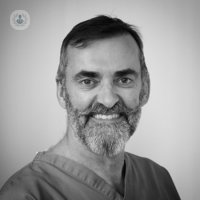Dental implant treatment: dispelling the myths
Autore:There are many misconceptions surrounding dental implants. Here Dr Peter Sanders from his dental clinic Dental Confidence dispels those myths and explains why implants are the best available solution to missing teeth.

Myth #1 – ‘Having dental implants is painful’
The truth: This is probably one of the biggest myths surrounding dental implants. Nearly all of our patients are pleasantly surprised at how little discomfort is experienced throughout the entire procedure. Dental implants are fixed under local anaesthetic, therefore the most you are likely to feel throughout the procedure would be a slight vibration or feeling of pressure. However, some patients do opt for sedation during a treatment, which is something that can be considered. There may be some tenderness shortly after surgery, but this is nearly always treatable with over the counter pain killers such as paracetamol or ibuprofen.
“I had nothing to be afraid of- I felt absolutely no pain at all, the procedure was completely fine. No discomfort was felt at all from start to finish.” Dental Confidence patient Anna Baldwin
“I had five implants placed at the top, and four at the bottom and these held the fixed teeth in like natural teeth. That was on Wednesday, and I was eating well on Thursday – and playing golf on Friday!” Dental Confidence patient, Oscar, after ‘Teeth in a Day’ treatment
Myth# 2 – ‘Dental implants look different to natural teeth’
The truth: Our restorations are developed to look, feel and function exactly as your natural teeth would, allowing you to confidently speak, laugh, smile and eat. At Dental Confidence we make sure every element of the replacement is considered from matching the colour of the restoration to your natural teeth, to focusing on the phonetics so that your speech isn’t in any way compromised by your new replacements. Most of our patients comment on how their friends and family are unable to distinguish between their natural teeth and implants.
“Dr Sanders was very professional and took a lot of care to make sure everything was perfect. He made a point of making sure the crown was just right and the colour match was perfect. Now it’s impossible to tell which tooth is an implant.” Dental Confidence patient, David Wood.
Myth# 3 – ‘Dental implants are really expensive’
The truth: Whilst dental implants may initially appear to be an expensive option, it is important to consider that they can be a lifelong solution to tooth loss. The British Dental Health Foundation stated that ‘over the longer term, implants are usually a more cost-effective and satisfactory option.’ Take for example of a bridge, which has a life expectancy of around 10 years. An implant may appear to be a more expensive option at first glance, but the benefits and the duration of implants make it a long-lasting solution.
“I had two implants on the upper right fitted, to replace the bridge. I was so pleased with the results; I replaced the bridge on the other side. I’m over the moon with the results. Cosmetically the implants are great and look so natural. Overall, it has been worth every single penny.” Dental Confidence patient, Pam Chant.
Myth #4 – ‘You can only eat soft foods with dental implants’
The truth: Once implants are fitted, after a brief healing process, you can eat all types of food, in fact, many of our patients describe the joy of eating things like steak, nuts and apples, as having had gaps, dentures or failing teeth had prevented them from enjoying.
“To have the freedom of biting an apple or eating pork crackling was something I really missed. People think it isn’t a big thing, but to be able to eat food that you couldn’t before, makes a huge difference. Implants are as close to having your own teeth back as you can get.” Dental Confidence patient, Richard Stanbridge
Myth #5 – ‘Any UK dentist can place dental implants’
Technically, this myth is true, any UK-registered dentist can perform dental implant surgery. However, placing implants involves various complex surgical and restorative dental procedures and therefore the competency of a dentist is absolutely critical. To place an implant, a dentist must have undertaken suitable postgraduate training and assessment, which has included practical implant placement.
If you are looking for an implant dentist, it’s also advisable to visit a dedicated implant centre, as having a strong focus on the treatment will mean these practices are most experienced and therefore should be using the most advanced modern techniques and state of the art technology on a day-to-day basis.
“It’s not just his skill that makes him special. Peter Sanders is a perfectionist, a true professional who has continued over the years to self-develop and fund his continued passion for his profession to become, in my opinion, one of the best dental professionals in the UK. His understanding of phobias, his abilities, his fun-loving and deeply caring personality, make him unique. I know that he is one of the best dental surgeons and implantologists in the UK.” Dental Confidence patient, Sue Page.
If you like to find out if dental implants are suitable for you, do not hesitate to book an appointment with Dr Sanders today via his Top Doctor’s profile and his clinic will be in touch to accommodate your needs.


